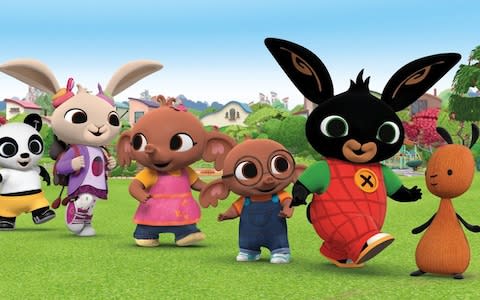Bing breaks America? CBeebies cartoon takes 'gentle parenting' to US and China

Plenty of British acts have tried and failed to break America. But a bunny rabbit in dungarees just might succeed.
Bing, the gentle BBC children's show that has quietly become a global phenomenon, is launching this year in the US and China.
If you don't have pre-school children, the CBeebies hit may have passed you by. But over Christmas, Bing was the fourth most requested programme on iPlayer, ahead of the BBC's adaptations of A Christmas Carol and His Dark Materials. It was viewed 4,915,000 times.
The US and China will join 119 other countries that broadcast the show, which is a favourite with many parents.
"We get mums saying, ‘Oh, it’s 11 o’clock at night and I’m still watching Bing, the kids have been in bed for hours, what am I doing?" said Mikael Shields, who leads the team behind the show.
In each short episode, three-year-old rabbit Bing faces new situations which his carer, Flop, helps him to navigate.
"We don’t preach. We are not in the business of telling anybody how to parent their children. There are strategies but there is no finger-wagging. Flop is patient, he’s incredibly present, he’s got a joyful sense that Bing will be just fine," Shield said.
In the UK, Flop is voiced by Sir Mark Rylance, although a US actor will replace him when the show launches across the Atlantic.
Shields approached Sir Mark after seeing him on stage in the play Jerusalem. "We had tried 30 household names and they were either too 'virile dad', which is a problem, or they were too grandfatherly and lacking in power.
"So I wrote to Mark and he was interested. I'm immensely grateful to him for seeing the value and meaning in what we've done."

Bing launched on the CBeebies channel in 2014. Key to its success, according to Shields, is the show's availability on different platforms.
He said: "We have to meet the audience’s needs. So we’ve come up with this idea we call ‘emotional scheduling’. So if you’re a millennial mum, you might have an iPad at the breakfast table because life is tough; in the car they might be on your mobile phone; at the picnic with your relatives they might be back on the iPad; and on a Sunday morning they might be watching a big screen television in the front room. That’s a really recognisable pattern to all of us."
Shield's company, Acamar Films, has launched a Bing app. "In five years’ time I think it will probably be the most important way we reach our audience," he said.
According to figures from Ofcom, one per cent of 3-4 year-olds already have their own mobile phone and 19 per cent have their own tablet.
Shields, a former BBC executive who worked on hits including Wallace and Gromit and Teletubbies, looked at 600 show ideas before narrowing them down to a shortlist of three: Bing, The Gruffalo and Peppa Pig.
He insisted there are no regrets about choosing Bing over Peppa. “Not for a minute. It’s not that we turned it down, it’s that we chose this. It was the right choice.
“People say, ‘Are you the new Peppa Pig?’ No, we’re not, we’re Bing. It’s a little bit more about story and character. The essential offering of the show is a little bit more gentle, a little bit more reflective.”
Bing’s global reach is such that it has had one million YouTube views in Brazil, despite never having been marketed there, and has huge followings in Poland and Italy. The US and China launches will be followed by Russia and Japan.
Shields said: “The networked nature of the world means we can reach everyone. We’re already finding people in Uzbekistan.”


